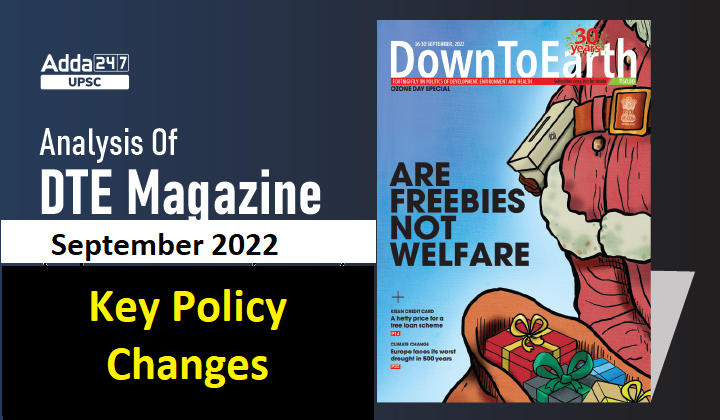Table of Contents
Down To Earth Magazine is a fortnightly magazine focusing on politics of environment and development, published in New Delhi, India.
UPSC Previous years’ questions on Development, Environment, Health and Disaster Management give us a clear idea about the increased importance of Down To Earth Magazine.
Down To Earth Magazine is one of the most important and indispensable sources for UPSC Civil Services Exam Preparation.
Keeping this in mind, here, we come with ”Gist Of Down To Earth Magazine” which covers important environmental current affairs articles in smooth pointed form, keeping in mind the demand of UPSC aspirants.
Battery Waste Management Rules, 2022
Why in news?
The Ministry of Environment, Forest and Climate Change published the Battery Waste Management Rules, 2022 to ensure environmentally sound management of all types of waste batteries, except those used in the defence and space industries.
Key Highlights of the Rules
- These rules will replace the Batteries (Management and Handling) Rules, 2001.
- The rules cover all types of batteries, including Electric Vehicle batteries, portable batteries, automotive batteries, and industrial batteries.
- The rules function based on the concept of Extended Producer Responsibility (EPR) where the producers of batteries are responsible for the collection and recycling/refurbishment of waste batteries and the use of recovered materials from waste into new batteries.
- EPR mandates that all waste batteries be collected and sent for recycling/refurbishment, and it prohibits disposal in landfills and incineration.
- To meet the EPR obligations, producers may engage themselves or authorise any other entity for the collection, recycling, or refurbishment of waste batteries.
- It will enable the setting up of a mechanism and centralized online portal for the exchange of EPR certificates between producers and recyclers/refurbishers to fulfill the obligations of producers.
Draft Indian Ports Bill, 2022
Why in news?
- The Union Ministry of Ports, Shipping and Waterways has prepared a draft Indian Ports Bill, 2022 to consolidate and amend the laws relating to ports.
- The proposed bill will streamline the development of the maritime sector, promote ease of doing business and incorporate state maritime boards in the national framework.
Why is the new bill being proposed?
- The draft IP Bill 2022 seeks to repeal and replace the 114-year-old Indian Ports Act of 1908.
- The Indian Ports Act, of 1908 is more than 110 years old. It has become imperative that the Act is revamped to reflect the present-day frameworks, incorporate India’s international obligations, address emerging environmental concerns, and aid the consultative development of the ports sector in the national interest.
- Key Objectives:
- To establish a national council for fostering structured growth and development of the port sector, and ensure optimum utilisation of the coastline of India
- To empower and establish State Maritime Boards for effective administration, control and management of non-major ports in India;
- To provide for adjudicatory mechanisms for redressal of port-related disputes.
- Prevention and containment of pollution at ports, and take measures for conservation of ports.
Electric Vehicle and Allied Infrastructure Policy 2022
Why in news?
- The Union Territory of Ladakh has unveiled a five-year Electric Vehicle and Allied Infrastructure Policy 2022.
- The policy aims to promote innovation, research and skill development in the technology for electric vehicles, along with their speedy adoption
Key Highlights
- Ladakh announced its EV Policy on August 20 in line with the vision-2050 statement that the union territory announced two years ago.
- Reckoned with the most important aspect of carbon emissions, the new policy makes focuses on promotion of clean energy, developing a green and sustainable public transport system coupled with connectivity by all-weather roads.
- Ladakh’s ‘Electric Vehicle and Allied Infrastructure Policy 2022’ will be in force for the next five years till 2027.
- It aims to transform the UT into a torch-bearer in terms of the adoption of electric vehicles in the country and envisions encouraging an EV ecosystem.
- The policy would entail a 10 per cent capital subsidy on two-wheelers, three-wheelers, and four-wheelers and encourages sustainable and eco-friendly public transport.
- The public buses will be given a capital subsidy of 25 percent under the policy.



 TSPSC Group 1 Question Paper 2024, Downl...
TSPSC Group 1 Question Paper 2024, Downl...
 TSPSC Group 1 Answer key 2024 Out, Downl...
TSPSC Group 1 Answer key 2024 Out, Downl...
 UPSC Prelims 2024 Question Paper, Downlo...
UPSC Prelims 2024 Question Paper, Downlo...




